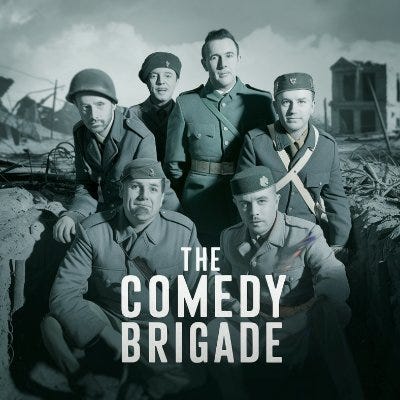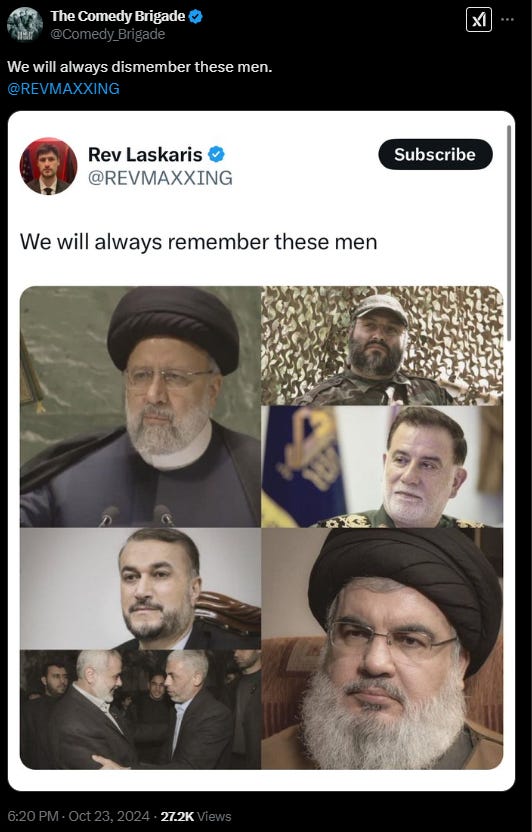The Comedy Brigade: Fighting Antisemitism One Joke at a Time
A group of comedians and Emmy winners have united to combat antisemitism with comedy

In an era where online discourse often feels like an endless loop of toxic arguments, a group of elite comedy writers has taken a fresh approach to combating antisemitism—through humor. The Comedy Brigade (@Comedy_Brigade) is the brainchild of 13 seasoned American comedy writers who have collectively contributed to shows like The Daily Show, The Tonight Show, Conan, Frasier, Roseanne, and others. With several Emmys among them, they’ve now turned their talents toward dismantling antisemitic rhetoric in the most effective way they know how: making people laugh at its absurdity.
The Rise of Antisemitism and the Power of Humor
Last month, the Anti-Defamation League (ADL) published a comprehensive survey revealing a shocking and alarming statistic: according to the survey, 46% of the world’s population holds antisemitic views. This isn't just 46% of a hostile Muslim country—it’s nearly half of the entire global population. The concern grows even more when considering that the number of antisemites worldwide has more than doubled since the last survey a decade ago. With nearly half of humanity against them, the Jewish people have drawn their ultimate weapon—humor.
Unlike the Jewish Brigade of WWII, which carried rifles onto the battlefield, the Comedy Brigade wields smartphones and fight in the digital arena.

The Birth of the "Comedy Brigade"
Dr. Racheli Baratz, head of the Anti-Antisemitism Department at the World Zionist Organization and the initiator of the project, explains how the idea was born. Along with comedy writer Omri Marcus, she sought an effective way to break the endless cycle of online hate. "We kept seeing the same people repeating the same blood libels and accusations. So when Omri suggested using humor as a weapon, it was a moment of realization. Instead of chasing every antisemitic post, we could simply turn the hate-spreaders themselves into the joke."
Thus, the "Comedy Brigade" was formed. They began recruiting top comedic minds—writers, stand-up comedians, and talented creators from around the world. To their surprise, almost everyone they approached was eager to join. "They immediately understood the potential of using humor as a tool against antisemitism," says Baratz.
“We have to fight back. A sharp anti-antisemitic response makes the original poster look foolish. If these people realize they are broadcasting their idiocy to the world, they might think twice before posting."
—Comedy writer Omri Marcus
Making Antisemites Look Foolish
The members of the Comedy Brigade are spread across several continents, generating three to four responses daily to antisemitic content. Jonathan Kesselman, director and creator of the comedy film The Hebrew Hammer (starring Adam Goldberg), describes their process: "We have a WhatsApp group. Every morning, the group admins post antisemitic tweets or posts that surfaced online, and we pitch joke responses, hoping that our reply will overshadow the original hateful post."
Josh Comers, a multiple Emmy nominee and a former writer for Conan O’Brien and Jimmy Fallon, explains the dynamic: "It works like a writers’ room. We get an assignment in the form of an antisemitic tweet that we need to counter with a joke. Then, we pitch responses, and like in any writers' room, it’s fun to see if my joke gets chosen in the end."
Omri Marcus emphasizes the urgency of the initiative: "People don’t realize that we are on the brink of an antisemitic wave, fueled by changes in social media. Facebook and Twitter have stopped fact-checking, replacing it with ‘community notes.’ The concept of ‘truth’ is disappearing, leading to an antisemitic surge like never before. We have to fight back. A sharp anti-antisemitic response makes the original poster look foolish. If these people realize they are broadcasting their idiocy to the world, they might think twice before posting."

Avoiding Unintentional Amplification
Does responding to antisemitic tweets only give them more exposure? Marcus acknowledges the concern: "You’re absolutely right. That’s why we stopped retweeting antisemitic posts. Initially, we did, but it was a mistake. Now, we take screenshots instead. And we only respond to accounts that already have a large following—so they already have a platform. I follow hundreds of leading antisemitic influencers and start my day by reviewing dozens of antisemitic posts. It’s insane. It ranges from bot accounts posting ridiculous claims to full-blown conspiracy theories—like one claiming that Yitzhak Rabin assassinated JFK, complete with ‘proof’ that Rabin was in the U.S. at the time of the murder. The level of absurdity is off the charts."
From Passive to Active Advocacy
Unlike other artists who have long been vocal supporters of Israel, many in the Comedy Brigade were not previously active in the political arena. However, the events of October 7 changed everything.
Michael Kaplan, an Emmy-winning writer for Frasier, shares his transformation:
"I always considered myself pro-Israel. I believe Jews deserve a state, so by definition, I’m a Zionist. But it wasn’t something I actively engaged in. I visited Israel once as a tourist. But after October 7, when I saw the rise of antisemitism in Hollywood and the silence from my peers in the Writers Guild, it deeply affected me. It was shocking and heartbreaking. Many Jews in the liberal camp felt betrayed. Since then, this cause has taken up a major part of my life."
Tammy Golden, a writer for Mystery Science Theater 3000, also found herself compelled to take action. "I wasn’t very active in Jewish causes. I grew up in Chicago in an area where my family was the only Jewish one, so I kept a low profile about my Judaism. But after October 7, I started feeling unsafe, and that changed everything."
Using Comedy to Disarm Hate
"The Comedy Brigade offers a non-conventional weapon in this endless war," says Marcus. "We are up against a highly sophisticated and well-funded machine that spreads antisemitism like a cancerous tumor. The same content is repackaged for different audiences by different speakers, amplified by bots. In a post-truth era, we can’t fight antisemitism with facts. We need a different approach—to ridicule these accounts. While bots won’t be affected, we know that influencers hate being laughed at."

Can Comedy Change Minds?
Kaplan: "It’s hard to say what changes people’s minds, but I believe humor can. There’s an old quote: ‘You can’t use facts to change someone’s mind if they didn’t use facts to form their opinion in the first place.’ Sometimes, mockery is the best way to dismantle something blatantly stupid."
Comers: "Comedy hits in a way that facts and passionate arguments often don’t. Especially on social media, where a sharp joke can cut through the noise."
Golden: "The most effective way to deflate evil is to laugh at it. You can’t really bully a kid on the playground if he just keeps laughing at you—especially if he gets the other kids to laugh at you too."
Kesselman: "I see comedy as a beautifully wrapped idea—if you make people laugh, you win. If a joke lands, there’s some truth to it. No matter how powerful, evil, or hateful someone is, if you can get others to laugh at their ridiculousness—you’ve already won."


